
Lawicel CAN Controller Area Networking
 |
Grantronics: Lawicel CAN Controller Area Networking |
CAN or Controller Area Network is a robust industrial strength hardware and software protocol used to communicate between microcontrollers. It is very popular in modern automotive applications and is gaining popularity in industrial and home automation applications.
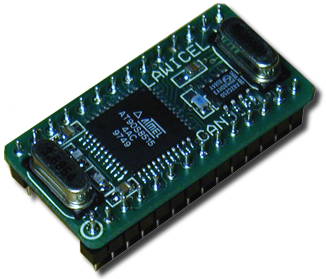 |
This is the CANDIP/AVR, which is the size of a DIP28. The CANDIP/AVR is equipped with an Atmel AT90S8515 AVR microcontroller and the SJA1000 CAN controller from Philips. |
| For more information (including schematics), go to: candip.com | |
Activity Boards for CANDIP/AVR
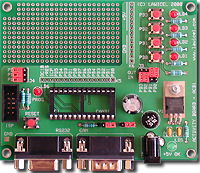 |
This is the Activity Board
(ACB1/1) for CANDIP. With this board you get a quick
start prototyping and testing CAN and your own system.
This board is great for educational purposes and a low
cost alternative to wire up something on your own. Click on the photo for a larger picture showing all features of the Activity board. Also available is the ACB1/2 (not shown) is a bare Activity Board that may be partly populated to suit individual requirements. |
| For more activitry board information, go to: candip.com | |
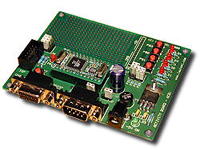 |
CANDIP/ST1 consist of one
CANDIP/AVR, one Activity board (ACB1/1), diskette with
sample programs written in ICCAVR, CodeVisionAVR C and BASCOM-AVR. On the diskette, there
are also manuals and
datasheets. As an option it is possible to include
compilers, programmers, AC/DC adapters cables etc. Just
ask us what you need and we can offer a bundle price. Click on the image for a bigger picture. |
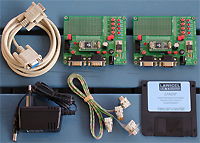 |
CANDIP/ST2 consists of two
CANDIP/ST1 plus one RS-232 cable, one 1m CAN cable, and
more sample programs demonstrating distributed I/O and
the Philips PeliCAN mode. The European AC/DC adapter is not included. Australian adaptors are available separately (300mA for 3-4 ST1's). |
| For more starter kit information, go to: candip.com | |
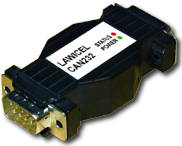 |
CAN232 is an RS232 to CAN "dongle" to be used with any
PC/UNIX/LINUX software or an existing embedded microcontroller that has an RS232 port
available.
CAN232 is a low cost tool to get CAN connectivity without the need of drivers etc. You simply use your own RS232 driver (in e.g. Visual Basic, Delphi, C++ etc.) and send/receive ASCII commands. |
| For more CAN232 information, go to: lawicel.com | |
| WiCAN Layer 2 CANlib for ImageCraft ICCAVR and SJA1000 | |
|---|---|
| WiCAN
CANlib is an easy way of getting up
running quickly and you do not need a great knowledge of
how CAN works. WiCAN currently supports only 11bit
identifiers in Philips PeliCAN mode, easy initialization
of the CAN controller with standard bitrates and
user-defined FIFO queues for receiving and transmitting
CAN frames through interrupt control, status information
etc. The reason for minimal support is to minimize the
resources used in the AVR, so there is plenty of room for
the actual application both in RAM and FLASH. It is easy
to change the support to extended frames, but since many
HLP (Higher Level Protocols) and applications today do
not use or support the extended frame we didn't include
it as default to save resources. Currently the WiCAN LIB
takes less than 2k of the total 8k code space (AT90S8515)
together with the demo application (tested in ICCAVR
6.17A/PRO). RAM depends on how many frames you have in
the FIFO queues. So you have more than 6k code (FLASH)
for your own application! There are 3 versions of the WiCAN CANlib for ICCAVR - CLIB/demo, CLIB/1 and CLIB/2. |
CLIB/demo
is a free version (demo, see below) with fixed 20kbit bus
speed and FIFO queues are preset to 4 CAN frames. With
this version it is possible to test the CANlib and to see
if it fits your needs. CLIB/1 is in Object form (LIB) and can not be changed. Both FIFO queues are preset to 4 CAN frames. This is an inexpensive way of testing the CANlib with full functionality (no speed limits). All you need to do is to include the LIB in the project and add a header file where all CANlib definitions are done. Sample programs are included to show how it works. We can of course change the size of the FIFO queues to suit your needs. CLIB/2 is in fully documented C source code and can be changed to suit your need. Both FIFO queues can be set to suit your needs but only in size of 1,2,4,8,16... to maximum RAM of the AVR. All you need to do is to include the WiCAN.C and WiCAN.H file to your project and you are up and running. Sample prgrams are included to show how it works. The source code is treated as a site licence and you may not distribute or sell the source code further on. Contact us for more information regarding this. |
| For more information about WiCAN CANlib, download the demo and PDF manual. | |
| Order Code | Description | Price (no GST) | Price inc GST |
| LawCDIP/AVRM162 | CANDIP/AVR module complete (M162) | $109.00 | $119.90 |
| LawACB1/1 | Activity board for CANDIP/AVR1 | $93.00 | $102.30 |
| LawCDIP/ST1 | CANDIP/AVR Starter Kit 1 (ACB1/1 + CANDIP/AVRM162) | $170.00 | $187.00 |
| LawCDIP/ST2M | CANDIP/AVR Starter Kit 2 (2 x ST1 + more, M162) | $460.00 | $506.00 |
| CAN232 | CAN to RS232 'dongle' interface | $160.00 | $176.00 |
| CAN-USB | CAN to USB 'dongle' interface | $230.00 | $253.00 |
| PP9DC150 | Plug Pack power supply for CANDIP/ST2 (9V 150mA) | $13.00 | $14.30 |
| PP9DC300 | Plug Pack power supply for CANDIP/ST2 (9V 300mA) | $13.50 | $14.85 |
| LawCLIB/1 | CANLIB in object form for ImageCraft ICCAVR C Compiler | $160.00 | $176.00 |
| LawCLIB/2 | CANLIB in source form for ImageCraft ICCAVR C
Compiler New Lower Price |
$500.00 | $550.00 |
NOTES
Other Lawicel products are available. Please ask for price and availability.
|
|
| Credit cards accepted | |
Last updated: 11 July 2007
Copyright © 2002, Grantronics Pty Ltd. All rights reserved.